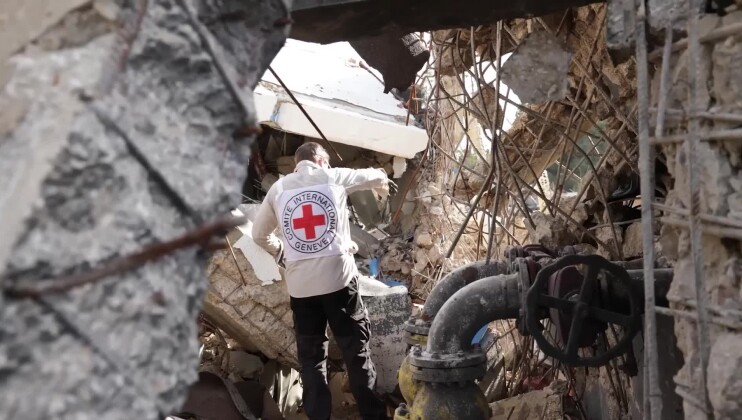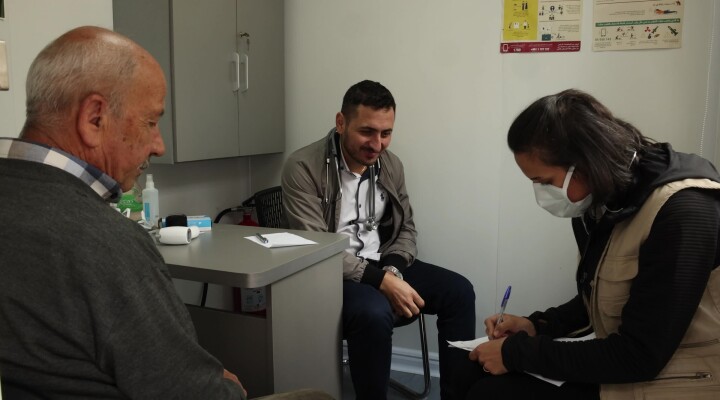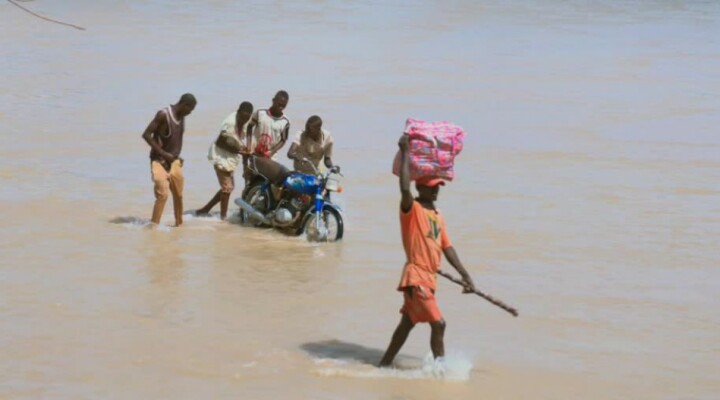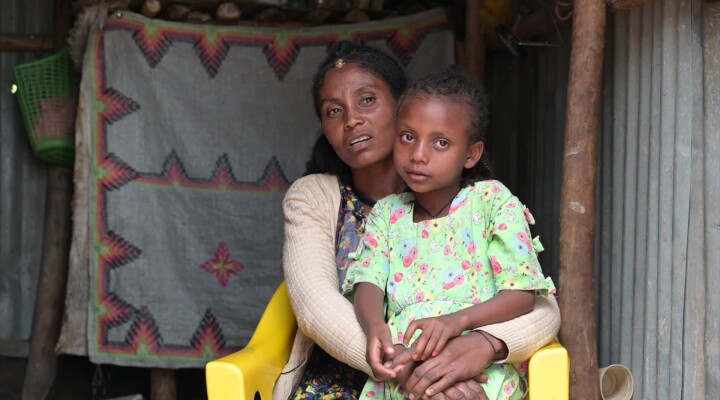Iraq: Four years later, much of Mosul still in ruins
Four years since the battle ended in Mosul, Iraq, much of the city is still in ruins. The depth of the destruction has made it impossible for thousands of families to return. For those who remained, daily life is a struggle—and potentially dangerous as mines and unexploded devices litter parts of the city.
“There are some dangerous places here that we are not allowed to play in because of mines,” said Yaqeen, 11 years old, who lives in Mosul’s old city. “Before the conflict, we had a shop here and I had friends. We used to go out and play. The houses here were so beautiful, unlike the way they are now: in ruins and damaged.”
Residents also face chronic water and electricity shortages. A recent study by the ICRC found that today less than 15 percent of people on Mosul’s left bank—the eastern half of the city—had enough water to meet their daily needs. On the right bank, this number rose to only 35 percent. This is partly because the war destroyed vital infrastructure like water pumping stations.
“Water pumps were destroyed during the conflict which means that the water doesn’t reach upper areas in the old city and people, me included, are forced to rely on water tanking services and jerrycans,” said Ahmad, a single father who returned to Mosul’s Old City three years ago. He is in a wheelchair after suffering an injury in the conflict.
At the same time, jobs are also limited in Mosul, making it difficult for families to afford rebuilding their homes. Samir, 52, father of five, lived in Klayaat, Mosul Old City his entire life. He returned home after three years and was able to repair his home with the help of an international organisation. But he is one of the lucky ones.
“Only four or five percent of the original population has returned here,” he said. “Today we need above all support to rehabilitate the roads and remove the rubble.”
The violence may have ended, but the needs in Mosul—and the wider Ninawa governorate—remain massive. The extent of the damage means that humanitarian aid alone will not be enough. Mosul will require continuous national and international investment to repair its deeply damaged infrastructure and ensure communities have access to basic services like shelter, water, electricity and health care.
“I hope things go back to how they used to be before,” said Yaqeen. “I wish the good days would return, especially the nice moments we spent with our relatives and neighbors.
For more information, please contact:
Imene Trabelsi (Beirut) itrabelsi@icrc.org +961 3 138 353
Hiba Adnan (Baghdad) hiadnan@icrc.org +9647835418580
Jason Straziuso (Geneva) jstraziuso@icrc.org +41227302077
ICRC in Ninawa – Facts and Figures 2021:
- More than 50,000 patients have received free medical care and more than 7,700 children have been vaccinated at primary health care centres supported by the ICRC.
- ICRC provided personal protective equipment, solar-powered refrigerators, and laptops to 50 COVID-19 vaccination centres.
- The livelihoods of more than 6,600 families were supported through cash, microeconomic initiatives, or agricultural and livestock programs.
Log-list
(Mosul 4 years)
SHOTLIST
Location: Mosul Old City
Length: 5:40
Format: HD mp4
Cameraperson: Mike Khalaf/ICRC
Producer: Mike Khalaf/ICRC
Production languages: Arabic
ICRC ref: 20211213-Mosul-4Years
Filming date: 24,25 November 2021
Copyright: ICRC access all
SCRIPT
00:00 External Inserts: Yaqeen, Mosul Old City Child / Location: Mosul Old City
00:27 Soundbite: Yaqeen, Mosul Old City Child / Location: Mosul Old City
My name is Yaqeen
I always wanted to become a doctor.
When I go to school I like to play with my friends, I enjoy learning.
After school, I like to play outside.
00:46 Soundbite: Yaqeen, Mosul Old City Child / Location: Mosul Old City
There are some dangerous places here that we are not allowed to play in because of mines.
Mines can explode and injure us.
00:56 Soundbite: Yaqeen, Mosul Old City Child / Location: Mosul Old City
Before the conflict, we had a shop here and I had friends. We used to go out and play. The houses here were so beautiful, unlike the way they’re now: in ruins and damaged. The shop here was my grandfather’s. He used to sell glass.
01:12 External Inserts: Yaqeen, Mosul Old City Child / Location: Mosul Old City
01:29 Soundbite: Yaqeen, Mosul Old City Child / Location: Mosul Old City
I hope things go back to how they used to be before.
I wish the good days return, especially the nice moments we spent with our relatives and neighbours.
01:42 External Inserts: Radwan, Yaqeen’s Father / Location: Mosul Old City
01:51 Soundbite: Radwan, Yaqeen’s Father / Location: Mosul Old City
The mosque was always full of people, and my father used to recite the call for prayer there.
Upon our return after the violence has stopped, local authorities came to remove mines and corpses.
This entire area was packed with dead bodies everywhere.
02:09 External Inserts: General scenes of destruction in Mosul Old City
03:00 Insert: Ahmad / Location: Klayaat, Mosul Old City
03:26 Soundbite: Ahmad / Location: Klayaat, Mosul Old City
At some point access upon our return to Klayaat area water access was okay
But then more people started returning to the old city of Mosul, now there is less water for everybody.
Soundbite: Ahmad / Location: Klayaat, Mosul Old City
We don’t have proper water pumps, as they were destroyed during the conflict which means that the water doesn’t reach upper areas in the old city and people, me included, are forced to rely on water tanking services and jerrycans.
03:58 Insert: Samir / Location: Klayaat, Mosul Old City
04:05 Soundbite: Samir / Location: Klayaat, Mosul Old City
The people that came back are few, maybe 4 or 5% of the original population returned.
If water and electricity are more available, that means for us decent living conditions.
We need support to rehabilitate the roads here and remove the
rubble.
If somebody wants to rehabilitate or rebuilt their house, he should find the resources to remove the rubble and pay for the constructions. And this is unaffordable for inhabitants.
04:35 Insert: Samir / Location: Klayaat, Mosul Old City
04:41 Soundbite: Mohammed, ICRC WatHab engineer in Mosul
Following the exit from the emergency phase, the ICRC with cooperation with Ninawa directorate of water, shifted into a new approach aiming to provide sustainable solution for water scarcity and water crisis.
To do so we are setting priorities areas of intervention and addressing root issues starting from water stations to water pumping stations.
ICRC Comprehensive Study of Mosul Water Services helped mapping the core challenges of water systems in the area.
challenges are linked to pumping system and gap in distribution systems, which requires an intervention to improve delivering these services safely to people
05:28 External Inserts: Mosul Old City Water pumps
05:40 ENDS



